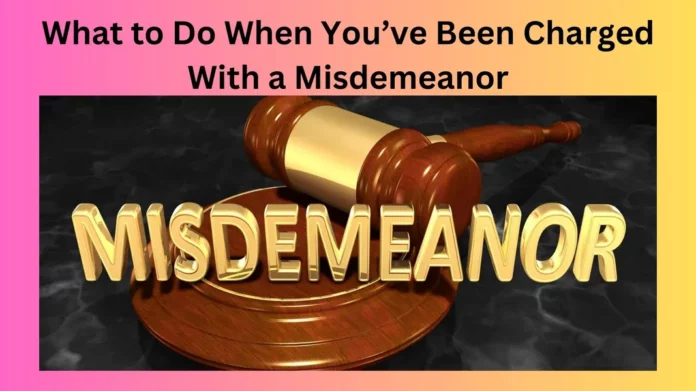Introduction:
Facing a misdemeanor charge can be a daunting experience, sending shockwaves through your life. In these uncertain times, it’s crucial to know your rights and understand the steps you can take to navigate the legal maze ahead. In this comprehensive guide, we’ll break down the key actions you should consider when you find yourself charged with a misdemeanor.
Understanding the Nature of Misdemeanors
Misdemeanors, often considered less serious than felonies, still carry significant consequences. From traffic violations to petty theft, misdemeanors cover a broad spectrum of offenses. Understanding the nature of the charge against you is the first step in formulating an effective response.
Assessing the Severity of Your Charge
Not all misdemeanors are created equal. It’s essential to determine the severity of your charge, as this will influence the potential penalties you may face. Some misdemeanors may only result in fines, while others could lead to probation or even short-term imprisonment.
Know Your Rights
Arming yourself with knowledge about your rights is crucial in any legal battle. From the right to remain silent to the right to legal representation, understanding what protections are afforded to you can significantly impact your case.
The Importance of Legal Representation
Seeking legal representation is not an admission of guilt; it’s a fundamental right. A skilled attorney can guide you through the legal process, ensuring that your rights are protected and advocating for the best possible outcome.
Steps to Take Immediately After Being Charged
In the aftermath of a misdemeanor charge, time is of the essence. Taking swift and decisive action can positively influence the trajectory of your case.
Gather Information and Document the Scene
The devil is in the details. Collecting evidence, documenting the scene, and gathering witness statements can be crucial in building a strong defense. Memories fade, so acting promptly can make a significant difference.
Bail and Booking Procedures
Understanding the bail and booking procedures is vital if you find yourself facing overnight detainment. Knowing your rights during this process can help alleviate the stress associated with being in custody.
Building a Strong Defense
Once you have a clear understanding of your charge and have gathered relevant information, it’s time to focus on building a robust defense strategy.
Working With Your Attorney
Collaboration with your attorney is key. Share all the details surrounding your case, be transparent about your actions, and trust the legal expertise that your attorney brings to the table.
Exploring Plea Options
In some cases, exploring plea options may be a strategic move. Your attorney can advise you on the potential benefits and drawbacks of various plea deals, helping you make an informed decision.
Courtroom Etiquette and Behavior
Navigating the courtroom can be overwhelming, especially if it’s your first time. Understanding proper etiquette and behavior is essential in presenting yourself positively to the judge and jury.
Dressing Appropriately
First impressions matter. Dressing appropriately for court can demonstrate respect for the legal process and may positively influence the perception of the court.
Maintaining Composure
Staying composed and focused during court proceedings is critical. Emotions can run high, but maintaining a calm demeanor can strengthen your case and leave a positive impression.
Potential Consequences and Penalties
Understanding the potential consequences and penalties associated with a misdemeanor conviction is crucial for making informed decisions throughout your legal journey.
Fines and Restitution
Misdemeanor convictions often come with financial consequences. Understanding the fines and potential restitution you may face is essential for proper preparation.
Probation and Community Service
In some cases, the court may impose probation or community service. Understanding the requirements and expectations associated with these alternatives to incarceration is vital.
Conclusion:
Being charged with a misdemeanor can be a life-altering experience, but it doesn’t have to define your future. By understanding your rights, taking immediate action, and building a strong defense, you can navigate this challenging period with resilience. Remember, seeking professional legal advice is not a sign of guilt but a proactive step toward securing the best possible outcome for your case.
Frequently Asked Questions (FAQs)
Q1: Should I hire an attorney for a misdemeanor charge?
Yes, hiring an attorney is crucial. They can provide legal guidance, protect your rights, and build a strong defense to help achieve the best possible outcome.
Q2: Can I represent myself in court for a misdemeanor charge?
While it’s technically possible, it’s highly recommended to have legal representation. Attorneys understand the legal intricacies and can navigate the system more effectively.
Q3: What are the potential long-term consequences of a misdemeanor conviction?
Long-term consequences may include difficulty finding employment, limitations on professional licenses, and challenges in securing housing or loans.
Q4: Can I negotiate with the prosecutor for a better plea deal?
In some cases, negotiations with the prosecutor can lead to a more favorable plea deal. Your attorney will guide you on the best strategy based on the specifics of your case.
Q5: How can I expunge a misdemeanor from my record?
Expungement eligibility varies by jurisdiction. Consult with an attorney to determine if you qualify and to guide you through the expungement process.















